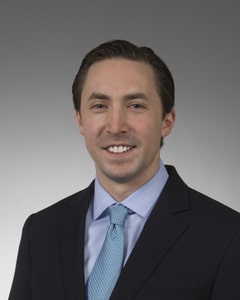Jameson Brown
Co-CEO and chief operating officer, The Hamilton Co.
Age: 32
Industry experience: 10 years
The apartment business runs in the family at The Hamilton Co., the Allston-based landlord and developer founded by the late Harold Brown. His son Jameson, after working as a real estate agent in Boston, joined the company in 2009. Following Harold Brown’s retirement in November 2017, capping a 64-year real estate career that built a $2.3-billion real estate empire, Jameson Brown was named co-CEO along with Chief Financial Officer Andy Bloch. The company manages and leases over 2.8 million square feet of commercial space and more than 5,600 residential units, including over 1,000 in the Allston neighborhood.
Q: What’s the best way to describe The Hamilton Co.’s niche in the multifamily market?
A: We tend to go for the moderate–rent apartments and we try to appeal to the broadest possible market. We’re not at the highest end, they’re not affordable, subsidized tax credit units. We’re not building the largest or smallest. We try to be right in the middle. In terms of condos, we’ve generally stayed away from them in this cycle. We’re long-term holders and we’d like to grow the company and hold onto our new developments and acquisitions. We have a long history in Allston–Brighton and it’s great to see new development is going on and can be supported, but we’ve just stayed away from condo development in this cycle. Rental demand continues to be very strong and there’s still strong demand from students and young professionals.
Q: Outside of Allston, what geographic markets look promising, particularly for new development?
A: In eastern Massachusetts, we do have a large suburban portfolio. Half of the unit count is in Boston and Brookline, and half is further out in the suburbs. We have a large presence in Woburn and Framingham, our furthest property is in Worcester and we have a small property in Nashua, New Hampshire. We like suburban multifamily. We’re seeing more new development, but it’s not something we’ve done for ourselves. Our past few development projects have all been on land that we’ve owned. We have a low cost basis, so that’s really where we’ve been taking advantage of opportunities. When you look at construction costs, the numbers make the most sense where you can get the highest rents, and that’s in the city.
Q: How big of an effect do you think private student housing developers such as Scape will have on the Boston multifamily market?
A: It was always interesting that Boston didn’t have more private student housing, given how many students we have here. Some schools built really flashy new dormitories, and there are always those students who want to be off-campus, and I think that it would apply to the private student housing as well. I don’t really understand to what extent those are controlled by the universities.
Q: Is it worth it to include ground-floor retail in multifamily projects, given the industry’s upheaval?
A: Retail is changing, no doubt. I think for urban mixed-use, especially in this location, it’s not a problem. There’s still high demand for restaurant uses, which we’re seeing in a lot of properties in Brighton and Allston, for the high-traffic, high-pedestrian and transit-oriented developments.
Q: How does the Hamilton Co.’s leadership structure break down?
A: It’s not the same without my father around, but he put a lot of good people and processes in place. We have a lot of long-term and some new people he brought on, including our construction arm. We have about 170 employees, including maintenance and construction workers. They provide construction management for any project done at our properties over a certain size. They also do all of our development projects. They work on the entitlements, permit expediting and the projects.
Q: As the son of Harold Brown, one of the biggest multifamily landlords in Boston history, how did your father influence your business philosophy?
A: That’s a tough question. I worked for him almost my entire career, so obviously he had a big influence on me and I was always involved in the business, as is typical in any family business. I talked about appealing to the broadest market and not going too high end. He influenced me in terms of staying in for the long haul. Don’t take huge short-term risks, try to be risk-averse and stay in for the long haul. He was always very involved with the business to the end. He wasn’t an absentee.
Brown’s Five Favorite Places to Get Ice Cream in Boston
- JP Licks
- Toscanini’s
- Eataly
- Picco
- Cookie Monstah






